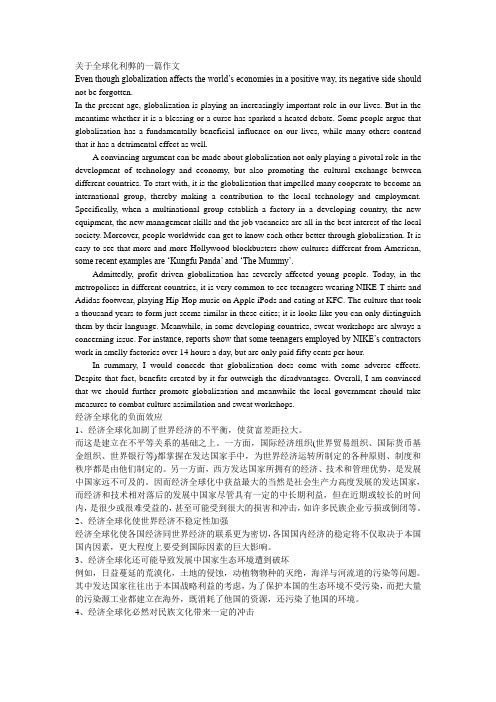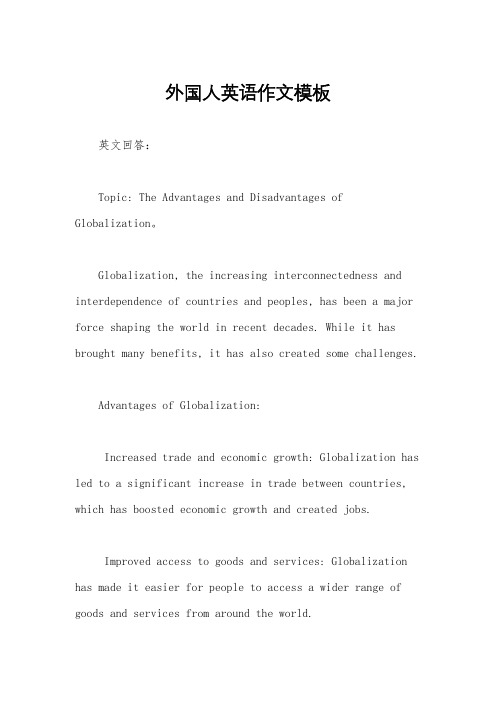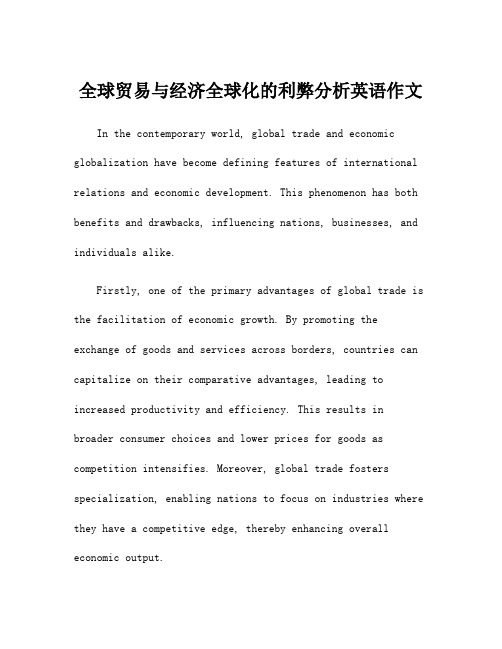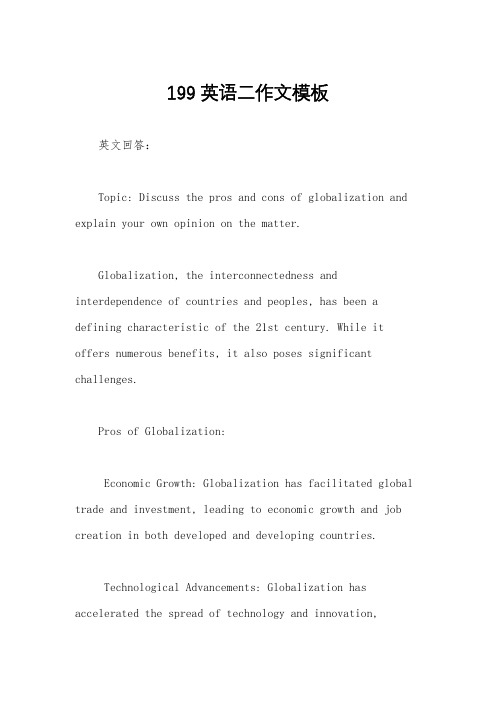全球化利弊英
全球化是一把双刃剑英语作文

全球化是一把双刃剑英语作文作文一全球化的利弊全球化就像一阵风,吹到了世界的每个角落。
对于我们学生来说,全球化带来了很多新东西。
比如说,我们能轻松地吃到国外的美食。
像肯德基、麦当劳,它们在好多国家都有。
我们在自己的城市就能吃到美国风味的汉堡和薯条,这多酷啊。
还有,我们能看到很多国外的电影和动画片。
像冰雪奇缘,那里面美丽的冰雪世界和动人的故事,让全世界的孩子都喜欢。
这就是全球化的好处,让我们的生活变得更加丰富有趣。
可是,全球化也有不好的地方。
有一些国外的文化进来,可能会影响我们自己的传统文化。
就像有些同学现在只想着过圣诞节、情人节,对我们中国的传统节日,像端午节、中秋节,却不那么重视了。
而且,全球化让一些企业竞争很激烈,有些小公司可能就因为外国大公司的竞争而倒闭了,这就会让一些人失业。
全球化是一把双刃剑,我们要好好对待它。
作文二全球化:福祸相依同学们,全球化这个事儿离我们可不远。
就拿我们的学习来说吧。
现在网络很发达,这也是全球化的一种体现。
我们可以在网上找到很多国外的学习资源。
我有个同学,他对科学很感兴趣,就在网上找到了国外的科学实验视频,那些视频里的实验特别酷,他跟着学了不少知识。
这就是全球化给我们学习带来的好处。
但是全球化也带来了麻烦。
有些外国的流行文化进来后,有些同学就开始盲目模仿。
我看到有的同学穿着奇装异服,说是国外的潮流,可是那些衣服并不适合在学校穿。
而且,全球化让市场上的东西变得很复杂。
有一些外国的不良商品也可能混进来。
就像有一些质量不好的外国文具,虽然样子好看,但是用不了多久就坏了。
全球化就像一个有好有坏的大礼包,我们要挑挑拣拣。
作文三全球化:双面效应同学们,咱们生活在一个全球化的时代。
这就像住在一个地球村里一样。
全球化给我们带来了好多新鲜玩意儿。
比如说,各种外国的体育运动。
篮球就是从国外传来的,现在咱们好多同学都特别喜欢打篮球。
看那些篮球明星在球场上飞奔、投篮,多帅气啊。
而且,通过打篮球,我们还能交到很多新朋友。
Globalization

关于全球化利弊的一篇作文Even though globalization affects the world’s economies in a positive way, its negative side should not be forgotten.In the present age, globalization is playing an increasingly important role in our lives. But in the meantime whether it is a blessing or a curse has sparked a heated debate. Some people argue that globalization has a fundamentally beneficial influence on our lives, while many others contend that it has a detrimental effect as well.A convincing argument can be made about globalization not only playing a pivotal role in the development of technology and economy, but also promoting the cultural exchange between different countries. To start with, it is the globalization that impelled many cooperate to become an international group, thereby making a contribution to the local technology and employment. Specifically, when a multinational group establish a factory in a developing country, the new equipment, the new management skills and the job vacancies are all in the best interest of the local society. Moreover, people worldwide can get to know each other better through globalization. It is easy to see that more and more Hollywood blockbusters show cultures different from American, some recent examples are ‘Kungfu Panda’ and ‘The Mummy’.Admittedly, profit driven globalization has severely affected young people. Today, in the metropolises in different countries, it is very common to see teenagers wearing NIKE T-shirts and Adidas footwear, playing Hip-Hop music on Apple iPods and eating at KFC. The culture that took a thousand years to form just seems similar in these cities; it is looks like you can only distinguish them by their language. Meanwhile, in some developing countries, sweat workshops are always a concerning issue. For in stance, reports show that some teenagers employed by NIKE’s contractors work in smelly factories over 14 hours a day, but are only paid fifty cents per hour.In summary, I would concede that globalization does come with some adverse effects. Despite that fact, benefits created by it far outweigh the disadvantages. Overall, I am convinced that we should further promote globalization and meanwhile the local government should take measures to combat culture assimilation and sweat workshops.经济全球化的负面效应1、经济全球化加剧了世界经济的不平衡,使贫富差距拉大。
全球化的利弊

Globalization is a new term that has found a significant place in the lives of the people. By globalization, we mean shedding down the walls of distrust and the barriers of suspicion in between countries, to make a bridge where ideas and beliefs can cross the borders. Though globalization today primarily covers the economical side, the impact is not limited to the economy only. It actually affects every aspect of life, like cultural, social, psychological and of course, political. While globalization is seen as a sign of a hopeful future by some, there are others who believe that it can cause tremendous disaster for the world economy. Read on to find the pros and cons of globalization. Pros Of Globalization•With globalization, there is a global market for companies to trade their products and a wider range of options for people, to choose from among theproducts of different nations.•Developing countries benefit a lot from globalization, as there is a sound flow of money and thus, a decrease in the currency difference.•To meet the increasing demands that follow globalization, there is an increase in the production sector. This gives loads of options to the manufacturers aswell.•Competition keeps prices relatively low, and as a result, inflation is less likely to occur.•The focus is diverted and segregated among all the nations. No country remains the single power head; instead there are compartmentalized powersectors. The decisions at higher levels are meant for the people at large.•Communication among the countries is on the rise, which allows for better understanding and broader vision.•As communication increases amongst two countries, there is interchange of cultures as well. We get to know more about the other's cultural preferences.•As we feed to each other's financial needs, the ecological imbalance is also meted out. Governments of countries show concern about each other.Cons Of Globalization•Globalization is causing Europeans to lose their jobs as work is being outsourced to the Asian countries. The cost of labor in the Asian countries islow as compared to other countries.•The high rate of profit for the companies, in Asia, has resulted in a pressure on the employed Europeans, who are always under the threat of the businessbeing outsourced.•Companies are as opening their counterparts in other countries. This results in transferring the quality of their product to other countries, thereby increasingthe chances of depreciation in terms of quality.•There are experts who believe that globalization is the cause for the invasion of communicable diseases and social degeneration in countries.•The threat that the corporates would rule the world is on high, as there is a lot of money invested by them.•It is often argued that poor countries are exploited by the richer countries where the work force is taken advantage of and low wages are implemented. Simply put, globalization is an ongoing process of integration of regional economies into global network of communication and execution. Let me explain this a bit. Assume that you are a mango farmer in India and you grow very good quality mangoes over there. Obviously, your fruit is highly appreciated in India, but you also know that you shall get a better value in US. So the network of communication and execution that allows you to sell your fruit in US is basically, the phenomenon of globalization. (At least the Indian farmer is happy about advantages of globalizationin India, he is earning a quick buck.) The advantages and disadvantages of globalization in India and other developing countries are very profound. Read more on advantages of globalization.Globalization: Advantages and DisadvantagesInstead of giving a few pointers here and a few pointers there, explanation on these concepts should do more justice to the subject. Have a look at the following Advantages and Disadvantages of Global MarketingThere has to be operational differences between various companies in different countries. What I mean to say is, a car manufacturer of UK will manufacture a car with a different operation than a car manufacturer in Italy (for example Jaguar and Ferrari). Both are trying to take advantage of the operational difference that they have between them. And both companies are trying to sell a car in America for a greater value. So if you want your product to have an appeal on a global scale, then obviously, marketing on a global scale is required.Advantages of Global Marketing•Lower Marketing Costs: If you are to considerlump-some cost then, yes, it is high, but the samecost even goes even higher if the company has tomarket a product differently in every country that itis selling.•Global Scope: Scope of this kind of marketing is solarge that it becomes a unique experience.•Brand image Consistency: Global marketing allowsyou to have a consistent image in every region thatyou choose to market.•Quick and Efficient Use of Ideas: A global entity isable to use a marketing idea and mould it into astrategy to implement on a global scale.•Uniformity in Marketing Practices: A global entity cankeep some degree of uniformity in marketing throughout the world.Disadvantages of Global Marketing•Inconsistency in Consumer Needs: American consumerwill be different from the South African. Globalmarketing should be able to address that.•Consumer Response Inconsistency: Consumer in onecountry may react differently than a consumer inanother country.•Country Specific Brand and Product: A Japanese mightlike a product to have a traditional touch, where as anAmerican might like to add a retro modern look to it.In this case, a global strategy is difficult to device.•The Laws of the Land Have to be Considered: Originalcompany policies may be according to the laws ofhome countries. The overseas laws may beconflicting in these policies.•Infrastructural Differences: Infrastructure may behampering the process in one country andaccelerating in another. Global strategy cannot beconsistent in such a scenario.Advantages and Disadvantages of Globalization in Developing Countries Overall globalization has been a big boon for the developing countries, but there are a few who say that it has been a curse. Let us take a look at both these aspects of globalization.The Advantages•GDP Increase: If the statistics are any indication, GDPof the developing countries have increased twice asmuch as before.•Percapita Income Increase: The wealth has had atrickling effect on the poor. The average income hasincreased to thrice as much.•Unemployment is Reduced: This fact is quite evidentwhen you look at countries like India and China.•Education has Increased: Globalization has been acatalyst to the jobs that require higher skill set. Thisdemand allowed people to gain higher education.•Competition on Even Platform: The companies allaround the world are competing on a single globalplatform. This allows better options to consumers. The Disadvantages•Uneven Distribution of Wealth: Wealth is stillconcentrated in the hands of a few individuals and acommon man in a developing country is yet to seeany major benefits of globalization.•Income Gap Between Developed and DevelopingCountries: Wealth of developed countries continuesto grow twice as much as the developing world.•Different Wage Standards for Developing Countries: Atechnology worker may get more value for his workin a developed country than a worker in a developingcountry.•Reversal of Globalization: In future, factors such aswar may demand the reversal of the globalization (asevident in inter world war years), current process ofglobalization may just be impossible to reverse. Youcan also like to read more on pros and cons ofglobalization.•Globalization is a commonly used term to represent the dissemination of practices, notions and technologies across the globe. Nations are also lookingat a free economy with a free market for goods and services. This has brought forth de-localization and rise in the multinational corporations. There are both pros and cons for globalization.More Liquidity in Capital and Reduced Financial Risk•Globalization implies free trade, and free trade involves an increased cash flow. When the financial flow increases, redistribution of capital takes placeand thus there is more liquidity in capital. In post-globalization, the financialinstitutions and markets have a wide reach that creates a capability to disperse the risk more extensively than before. One major advantage of globalization is that the investors have the privilege to take only the financial risk they wish to.Economical Advantage•Globalization involves de-localization, which means that most of the activities of a business are now done across distances. The multinationals hire theirworkforce from overseas so as to obtain inexpensive labor. This leads tohigher employment rate in the developing countries, thus improving theireconomies. The investors can also invest money in the developing countries.Therefore, the flow of communications is increased across the globe, which inturn brings forth economic advantage. In other words, globalization allows anincreased flow of communication across the world, which ensures sharing ofindispensable information between individuals and the organizations. This use of technology in communication saves time, which in turn saves money for the corporations. Thus, the multinational can become profitable by the use of thenew means of communication. Besides, globalization provides speedytransportation of goods as well as people. This in turn brings forth obviouseconomic advantage for the corporations.Interdependability etween Nations•The disadvantages of globalization are closely linked to its advantages. The interdependability between nations can work as an advantage and adisadvantage. The problem is that if one nation suffers from economicdisruptions, it is most likely that all other dependent nations are also affected.Thus, the risks become more global.Unemployment•The multinationals usually look out for making profits. The developing nations have good workforces that are not only skilled but also cheap. So there would be an increased flow of both skilled and non-skilled jobs from thedeveloping nations to the developed nations. This is not good for thedeveloped nations because there are chances for unemployment in thedeveloped nations where the multinational would have previously held itsoperation.经济全球化的利弊分析:应当承认,世界经济全球化的进程才刚刚起步,它给各国经济和整个世界经济带来的影响还难以预料,但是有一点是非常明确的,即经济全球化是一把“双刃剑”。
外国人英语作文模板

外国人英语作文模板英文回答:Topic: The Advantages and Disadvantages of Globalization。
Globalization, the increasing interconnectedness and interdependence of countries and peoples, has been a major force shaping the world in recent decades. While it has brought many benefits, it has also created some challenges.Advantages of Globalization:Increased trade and economic growth: Globalization has led to a significant increase in trade between countries, which has boosted economic growth and created jobs.Improved access to goods and services: Globalization has made it easier for people to access a wider range of goods and services from around the world.Cultural exchange and understanding: Globalization has facilitated the exchange of ideas, cultures, and traditions, leading to a greater understanding and appreciation of diversity.Improved healthcare and education: Globalization has enabled the sharing of knowledge and technology, which has improved healthcare and education in many countries.Greater mobility: Globalization has made it easier for people to travel and work abroad, providing them with more opportunities and experiences.Disadvantages of Globalization:Widened income inequality: Globalization has led to increased income inequality within and between countries,as some workers and industries have benefited more from globalization than others.Job losses: Globalization has contributed to joblosses in some industries, particularly in developed countries, as companies have moved production to countries with lower labor costs.Environmental degradation: Increased trade and production has led to increased pollution and other environmental problems.Cultural homogenization: Globalization can lead to the spread of Western culture and values, which can threaten the diversity of local cultures.Increased vulnerability to crises: Globalization has made countries more interconnected, which can make them more vulnerable to crises such as financial crises or pandemics.Balancing the Advantages and Disadvantages:The advantages and disadvantages of globalization must be carefully weighed and balanced. While globalization has brought many benefits, it is important to address thechallenges it has created. Governments and international organizations should work together to mitigate the negative effects of globalization while harnessing its potential for progress.中文回答:全球化的利与弊。
全球贸易与经济全球化的利弊分析英语作文

全球贸易与经济全球化的利弊分析英语作文In the contemporary world, global trade and economic globalization have become defining features of international relations and economic development. This phenomenon has both benefits and drawbacks, influencing nations, businesses, and individuals alike.Firstly, one of the primary advantages of global trade is the facilitation of economic growth. By promoting the exchange of goods and services across borders, countries can capitalize on their comparative advantages, leading to increased productivity and efficiency. This results in broader consumer choices and lower prices for goods as competition intensifies. Moreover, global trade fosters specialization, enabling nations to focus on industries where they have a competitive edge, thereby enhancing overall economic output.Furthermore, economic globalization encourages foreign direct investment (FDI), allowing businesses to expand into new markets and diversify their operations. This influx of capital can stimulate local economies, create job opportunities, and transfer technology and knowledge across borders. For developing countries, in particular, FDI can act as a catalyst for industrialization and infrastructure development, propelling them towards economic advancement.On the other hand, economic globalization is not without its challenges and criticisms. One significant concern is the exacerbation of income inequality within and between nations. While global trade can boost national economies, its benefits are often unevenly distributed, with marginalized communities and regions often left behind. This inequality can lead to social unrest and political instability, undermining the potential gains from economic integration.Moreover, economic globalization has been blamed for environmental degradation. The increased movement of goods and services worldwide has escalated carbon emissions and pollution levels, contributing to climate change and biodiversity loss. The pursuit of economic growth at all costs has led to unsustainable resource exploitation and ecological footprint, posing long-term risks to the planet's health and future generations.Another drawback of economic globalization is its potential to undermine national sovereignty. As countries become more interconnected economically, they may face pressure to conform to global trade rules and regulations set by international organizations and agreements. This can limit a nation's ability to enact policies that prioritize domestic interests, such as environmental protection, labor standards, and social welfare.Additionally, global trade can make economies more vulnerable to external shocks and economic downturns. Interdependence among nations means that economic crises in one country can quickly spread to others through trade channels, leading to a synchronized global recession. The 2008 financial crisis and more recent disruptions caused by the COVID-19 pandemic illustrate how interconnectedness can amplify economic instability and uncertainty.In conclusion, while global trade and economic globalization offer substantial benefits in terms of economic growth, efficiency, and international cooperation, they also present significant challenges that must be addressed. Governments, businesses, and international organizations need to strive for more inclusive and sustainable forms of economic integration, ensuring that the benefits of globalization are equitably shared while mitigating its adverse effects on society, the environment, and national sovereignty. Only through thoughtful policy-making and globalcooperation can we harness the full potential of global trade while minimizing its drawbacks in the pursuit of a more prosperous and equitable world.。
英语全球化

英语全球化的利弊With the process of globalization, English becomes more and more popular. Faced with the question whether the spread of English all over the world is advantageous or not, there is no consensus of opinion among people. As to me, I will say it is disadvantageous without any hesitation. A number of factors could account for this phenomenon. First and foremost, English can divide the society into many classes, which widen the gap between the rich and the poor. We can take China as an example, recently, English becomes more and more popular, and lots of companies regard English as a boundary in interviews. In China, if there are two people who own same education seeking for the same job, under this circumstance, the one who masters English better will get more chance and this situation also adapt for many other countries. Secondly, English is endangering linguistic diversity and causing culture disaster. The linguists says that there are almost seventy thousand kinds of languages in the world, and half of them on the brink of extinction, what’s worse, every two weeks there is one language disappearing, which is two times as many as mammals, and four times as many as birds. There is no doubt that English accelerates this course. Besides, language is the carrier of culture, that is to say, the variety of culture is also in a dangerous state with the extinction of languages. To some degree, we can also gain information from many countries’ behavior. In 2000, Poland’s government makes alaw for banning English used in their advertisements; in recent years, France also asks their people use French in formal occasions, except there isn’t a world to express the meaning, or it will be illegal. These examples can testify that English had led to linguistic and culture invasion. Last but not least. The widespread of English is also bad for itself. On the one hand, people from English countries are unwilling to learn other languages or get to know another culture, and some researches indicate that it’s more difficult for them to learn a second language than other countries, all of these can account for the popularity of English. On the other hand, English is also changed during the disseminative progress. It had already shaped the “new English”, such as Indian English, Chinglish and so on. All in all, the extinction of language, the fading of culture, and the invasion of other cultures and the changing of native English, which are all signals that the spread of English all over the world is disadvantageous.英语与全球贸易全球化与国际贸易由于全球化的原因,国际间的贸易不断增强。
经济全球化的

经济全球化economic globalization一、定义地理上分散于全球的经济活动开始综合和一体化的现象,其主体一般认为是跨国公司,具体表现为资本、技术、产品等跨国快速流动或扩散以及跨国公司垄断势力的强化。
经济全球化(Economic Globalization) 是指世界经济活动超越国界,通过对外贸易、资本流动、技术转移、提供服务、相互依存、相互联系而形成的全球范围的有机经济整体。
(简单的说也就是世界经济日益成为紧密联系的一个整体)。
经济全球化是当代世界经济的重要特征之一,也是世界经济发展的重要趋势。
二、简介经济全球化出现于20世纪80年代中期,90年代得到认可,但目前没有统一概念。
国际货币基金组织(IMF)在1997年5月发表的一份报告中指出,“经济全球化是指跨国商品与服务贸易及资本流动规模和形式的增加,以及技术的广泛迅速传播使世界各国经济的相互依赖性增强”。
而经济合作与发展组织(OECD)认为,“经济全球化可以被看作一种过程,在这个过程中,经济、市场、技术与通讯形式都越来越具有全球特征,民族性和地方性在减少”。
为此,可从三方面理解经济全球化:一是世界各国经济联系的加强和相互依赖程度日益提高;二是各国国内经济规则不断趋于一致;三是国际经济协调机制强化,即各种多边或区域组织对世界经济的协调和约束作用越来越强。
总的来讲,经济全球化是指以市场经济为基础,以先进科技和生产力为手段,以发达国家为主导,以最大利润和经济效益为目标,通过分工、贸易、投资、跨国公司和要素流动等,实现各国市场分工与协作,相互融合的过程。
经济全球化,有利于资源和生产要素在全球的合理配臵,有利于资本和产品在全球性流动,有利于科技在全球性的扩张,有利于促进不发达地区经济的发展,是人类发展进步的表现,是世界经济发展的必然结果。
但它对每个国家来说,都是一柄双刃剑,既是机遇,也是挑战。
特别是对经济实力薄弱和科学技术比较落后的发展中国家,面对全球性的激烈竞争,所遇到的风险、挑战将更加严峻。
199英语二作文模板

199英语二作文模板英文回答:Topic: Discuss the pros and cons of globalization and explain your own opinion on the matter.Globalization, the interconnectedness and interdependence of countries and peoples, has been a defining characteristic of the 21st century. While it offers numerous benefits, it also poses significant challenges.Pros of Globalization:Economic Growth: Globalization has facilitated global trade and investment, leading to economic growth and job creation in both developed and developing countries.Technological Advancements: Globalization has accelerated the spread of technology and innovation,improving living standards and addressing global challenges.Cultural Exchange: Globalization has fostered cultural exchange, promoting understanding and tolerance between different cultures.Global Collaboration: Globalization has enabled international cooperation on issues such as climate change, poverty, and public health.Cons of Globalization:Economic Inequality: Globalization can exacerbate economic inequality between nations and within societies,as it tends to benefit multinational corporations andskilled workers at the expense of low-skilled workers.Environmental Degradation: Globalization cancontribute to environmental degradation, as the transportation of goods and services across vast distances increases greenhouse gas emissions.Cultural Homogenization: Globalization can lead to a loss of cultural diversity as Western values and norms become more prevalent.Political Instability: Globalization can destabilize weak governments and fuel conflicts over resources and economic opportunities.My Opinion:While globalization presents both opportunities and challenges, I believe that its overall benefits outweighits drawbacks. Globalization has lifted millions of people out of poverty, improved living standards, and promoted global cooperation. However, it is essential to address the negative consequences of globalization and ensure that its benefits are shared equitably. By implementing policiesthat promote economic equality, protect the environment, preserve cultural diversity, and strengthen international cooperation, we can harness the potential of globalization while minimizing its risks.中文回答:全球化的利弊及个人看法。
- 1、下载文档前请自行甄别文档内容的完整性,平台不提供额外的编辑、内容补充、找答案等附加服务。
- 2、"仅部分预览"的文档,不可在线预览部分如存在完整性等问题,可反馈申请退款(可完整预览的文档不适用该条件!)。
- 3、如文档侵犯您的权益,请联系客服反馈,我们会尽快为您处理(人工客服工作时间:9:00-18:30)。
全球化利弊英
Document serial number【KK89K-LLS98YT-SS8CB-SSUT-SST108】
Problems:
Firstly, globalization can intensify the influence of economic crisis.
The instability of economy is a normal state. The economic dependence
between nations will make the crisis quickly infect other countries.
The crisis also becomes globalized.
Secondly, I think that the conflict will increase. Globalization
gives people more opportunities to communicate with others in other
nations, but the huge diversity of religion, race and education still
make it hard to get along in harmony.
Thirdly, globalization will increase the possibility of culture
hegemony and decrease the cultural diversity. Culture of nations
interweaves together by frequent culture exchange. The culture of the
nation is very easily influenced by other mainstream culture.
Fourthly, economic globalization renders a more competitive situation
for the enterprise and employed because it amplified the market which
means the enterprise should make itself survive in all enterprises of
the same kind and the employed should be competitive enough so that
they can win themselves the opportunity of work.
Benefits:
Firstly, globalization can accelerate the spread of the advanced
technology so to accelerate the development of the world.
Secondly, developing countries can benefits a lot from the
globalization. They can grasp the opportunities to develop their
economy relying on the technological and financial aid.
Thirdly, our life will become more convenient we can easily get the
goods and product of others countries in the ordinary supermarket.
